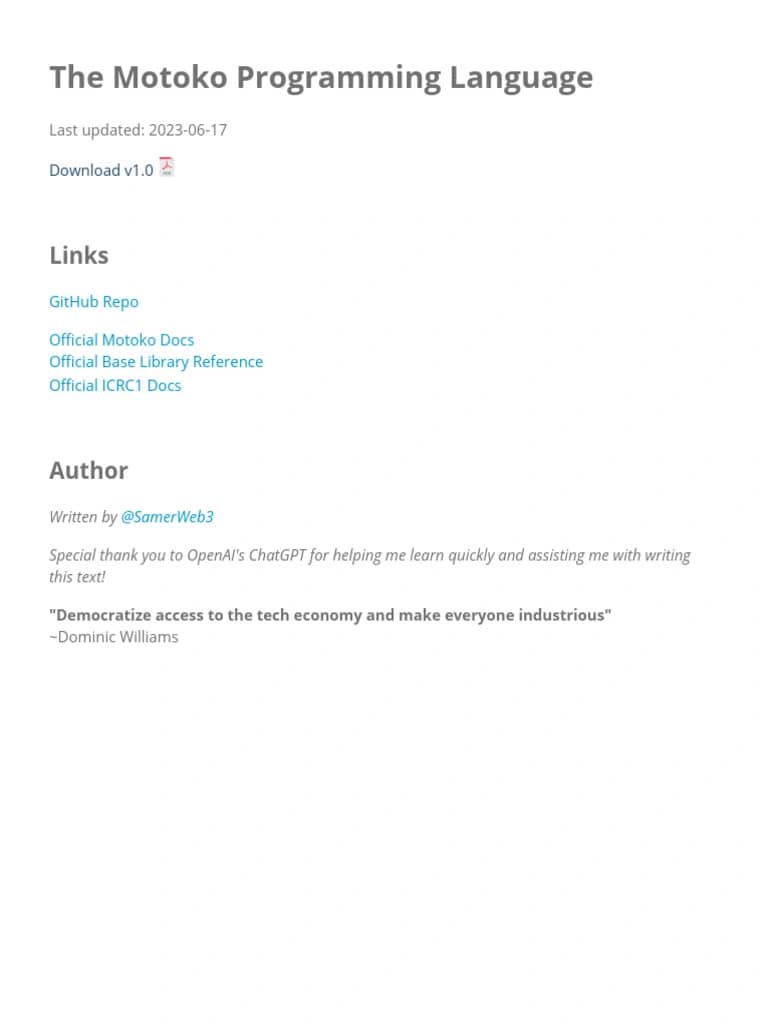Subscribe to wiki
Share wiki
Bookmark
Motoko Prog. Language
We've just announced IQ AI.
Motoko Prog. Language
Motoko is a programming language specifically designed for developing applications on the Internet Computer blockchain platform. It provides a type-safe and actor-based approach to building decentralized applications (dApps) with built-in support for the Internet Computer's unique features and capabilities.
Overview
Motoko was created by DFINITY, the organization behind the Internet Computer, to simplify the development of canister smart contracts. The language was designed from the ground up to take advantage of the Internet Computer's architecture while providing developers with modern language features and safety guarantees. Motoko combines functional programming concepts with an actor-based concurrency model, making it particularly well-suited for building scalable and secure distributed applications.
As a statically-typed language, Motoko helps developers catch errors at compile time rather than runtime, reducing the likelihood of bugs in deployed applications. It also features automatic memory management through garbage collection, eliminating common memory-related errors found in lower-level languages. These design choices reflect Motoko's focus on developer productivity and application security in the blockchain context.
Key Features
Motoko offers several distinctive features that make it suitable for Internet Computer development:
- Actor-based programming model: Actors in Motoko represent the fundamental unit of computation and state isolation, aligning with the Internet Computer's canister model [1]
- Static typing: The language employs a strong type system that helps catch errors during compilation rather than at runtime [1]
- Pattern matching: Motoko supports sophisticated pattern matching for data extraction and control flow [1]
- Automatic memory management: The language handles memory allocation and deallocation through garbage collection [1]
- Async/await: Built-in support for asynchronous programming with async/await syntax [1]
- Orthogonal persistence: Motoko simplifies state management by automatically persisting program state across upgrades [1]
Language Design
Motoko's design philosophy centers around providing a safe, expressive, and efficient language for Internet Computer development. The syntax draws inspiration from modern programming languages like Swift, Rust, and JavaScript, making it accessible to developers from various backgrounds.
The language uses a declarative approach where possible, allowing developers to express what they want to accomplish rather than specifying exact implementation details. This is particularly evident in Motoko's type system, which supports type inference to reduce verbosity while maintaining type safety.
One of Motoko's distinguishing characteristics is its first-class support for the actor model, which aligns with the Internet Computer's architecture:
actor Counter {
var count = 0;
public func increment() : async Nat {
count += 1;
return count;
}
public query func get() : async Nat {
return count;
}
}
This example demonstrates how actors in Motoko encapsulate state (the count variable) and expose functionality through public methods that can be called asynchronously from other canisters or from the frontend. [1]
Integration with Internet Computer
Motoko was specifically designed to work seamlessly with the Internet Computer protocol. It provides native abstractions for Internet Computer concepts such as:
- Canisters: Motoko actors compile directly to Internet Computer canisters [1]
- Update and query calls: The language distinguishes between state-modifying "update" calls and read-only "query" calls [1]
- Cycles: Built-in support for handling cycles, the computational resource tokens of the Internet Computer [1]
- Inter-canister calls: First-class support for communication between canisters [1]
The tight integration with the platform allows developers to leverage the Internet Computer's capabilities without having to write extensive boilerplate code or manage low-level details.
Development Environment
The primary development environment for Motoko is the DFINITY Canister SDK, also known as the DFINITY Software Development Kit (SDK). This toolkit includes:
- Motoko compiler: Translates Motoko code into WebAssembly modules that can run on the Internet Computer [1]
- dfx command-line tool: Provides utilities for creating, building, deploying, and managing Internet Computer applications [1]
- Vessel package manager: Helps manage dependencies for Motoko projects [1]
- Candid interface description language: Facilitates interoperability between canisters written in different languages [1]
Developers can also use the Motoko Playground, a web-based environment for experimenting with Motoko without installing the full SDK. This provides an accessible entry point for those new to the language.
Standard Library
Motoko comes with a standard library that provides common data structures and utilities:
- Base library: Includes fundamental types and functions for working with arrays, text, iterators, and more [1]
- Collections: Provides implementations of common data structures like hash maps, sets, and buffers [1]
- Time: Utilities for working with time values and durations [1]
- Debug: Functions for debugging and logging during development [1]
The standard library continues to evolve as the Motoko ecosystem grows, with new modules being added to address common development needs.
Comparison with Other Languages
While Motoko is the primary language for Internet Computer development, it's not the only option. The platform also supports:
- Rust: Offers more low-level control and potentially better performance for certain use cases [1]
- JavaScript/TypeScript: Through tools like Azle, allowing web developers to use familiar languages [1]
- Python: Via SDKs like Kybra that enable Python development for the Internet Computer [1]
Compared to these alternatives, Motoko offers the advantage of being purpose-built for the Internet Computer, with language features that directly map to platform concepts. However, it may have a steeper learning curve for developers not familiar with functional programming concepts or actor-based concurrency models.
Community and Resources
The Motoko community continues to grow alongside the broader Internet Computer ecosystem. Resources for learning and using Motoko include:
- Official documentation and tutorials provided by DFINITY [1]
- Community forums and discussion groups where developers can ask questions and share knowledge
- Open-source projects and examples that demonstrate Motoko best practices
- Educational content from community members, including articles, videos, and courses
See something wrong?
